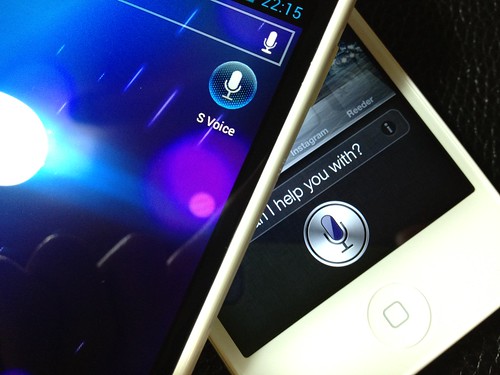ANZ 23 Mobile Things: Voice interaction and recording (18 June)
Posted by Sally Cummings on Wednesday, June 18, 2014 Under: Technology
This is a re-post of my original blog post "Thing 21: Voice interaction and recording" that I created for the ANZ 23 Mobile Things course last year.
*************************************************************************************************
I think we can all agree that one of the great things about modern mobile devices is the variety of ways that we can interact with them. Unlike older phones and desktop computers, we are no longer restricted to a keyboard (or mouse) interface - we can swipe, shake, tilt and talk to our devices to perform different functions. This week's thing is recording voice audio, and using our voice to interact with our device.
DISCOVER
Voice interaction functionality has been a major feature in recent smartphone releases, such as iOS's Siri, Android's Google Now, and Samsung's S Voice. These voice-activated interfaces allow users to verbally request information, make appointments and set reminders, dial phone numbers, and more. They generally utilise natural language, and may answer questions in a personal or informal manner.

Dragon speech-to-text products let us dictate to and/or command our mobile devices. Dragon Dictation (iOS) is a free app that converts your speech into text that can be utilised by other apps on your phone. Dragon Search (iOS) allows you to use your voice to search websites and other mobile content providers. Dragon for Email is available for Blackberry users, and hopefully Dragon Mobile Assistant (currently in beta in the US) will come to Australia and New Zealand soon for Android users. [edited to add: it looks like this app is available in Australia now :)]
SoundCloud was mentioned in Thing 20. Although it is mostly music oriented, it is also suitable for all kinds of audio recordings including podcasts, news and story telling.
EXPLORE
Does your smartphone include any native apps for recording voice memos? I often use iOS Voice Memos to quickly record and email a voice message to myself. Maybe you will also find this a useful or different way to capture thoughts on the go?
Download Dragon Dictation (or a similar speech-to-text app) and have a go at dictating a few sentences into the app. How well did it interpret your words? You can use the edit function within the app to correct any mistakes and add punctuation, and the share function lets you send the resulting text to an email, text message, tweet, Facebook status, or simply copy and use it wherever you need it (eg. Evernote, word processor, blogging platform, etc.).
AudioBoo is a social network for sharing audio. It is often used for recording and broadcasting podcasts, and has an active visually impaired community. Or if you've already tried SoundCloud from last week, perhaps this week you could have another play with it, but with an emphasis on voice recording. Maybe you could tell a funny story or share something that you've enjoyed about doing the 23 Mobile Things program - then share it on Twitter using the #anz23mthings hashtag.
Check out the 23 Mobile Things Pinterest board on voice recording and interaction for more information and links.
THINKING POINTS
Voice interaction and recording apps provide a different method of interaction with mobile devices, and can cater to users who have a personal preference for aural communication, or an aural learning style (rather than visual / written). How could you use these apps in your library to communicate with clients in a non-traditional way?
Speech-to-text and text-to-speech apps are especially useful for making content more accessible to visually and/or hearing impaired library users. Knowing your way around some of the available tools will help you to provide advice to clients with different access requirements. And of course you can use these apps yourself to proactively convert library-generated content in a variety of accessible formats.
Could your library use a service such as AudioBoo or SoundCloud to share oral histories, story time sessions, podcasts or author talks? Both of these audio sharing apps provide options to embed audio files in web pages, so users don't need to sign up in order to access the recordings.
Photo credit to Mike Lau.
In : Technology
Tags: "professional development" "mobile technology" apps accessibility libraries blogjune
blog comments powered by Disqus


